I have an issue of translating matrix into one hot encoding in R. I implemented in Matlab but i have difficulty in handling the object in R. Here i have an object of type 'matrix'.
I would like to apply one hot encoding to this matrix. I have problem with column names.
here is an example:
> set.seed(4)
> t <- matrix(floor(runif(10, 1,9)),5,5)
[,1] [,2] [,3] [,4] [,5]
[1,] 5 3 5 3 5
[2,] 1 6 1 6 1
[3,] 3 8 3 8 3
[4,] 3 8 3 8 3
[5,] 7 1 7 1 7
> class(t)
[1] "matrix"
Expecting:
1_1 1_3 1_5 1_7 2_1 2_3 2_6 2_8 ...
[1,] 0 0 1 0 0 1 0 0 ...
[2,] 1 0 0 0 0 0 1 0 ...
[3,] 0 1 0 0 0 0 0 1 ...
[4,] 0 1 0 0 0 0 0 1 ...
[5,] 0 0 0 1 1 0 0 0 ...
I tried the following, but the matrix remains the same.
library(data.table)
library(mltools)
test_table <- one_hot(as.data.table(t))
Any suggestions would be very much appreciated.
